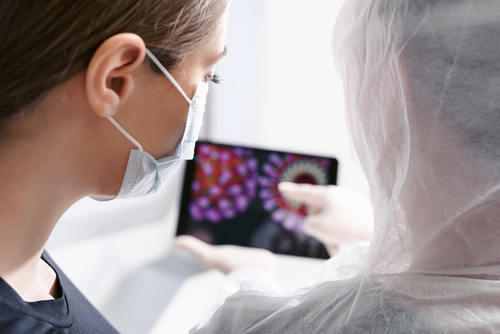Read the full paper
After infection with SARS-CoV-2, the virus responsible for causing COVID-19, most people develop antibodies directed towards the virus. While much is not yet known about the implications of carrying these antibodies, it is likely that they provide some degree of immunity against reinfection with SARS-CoV-2, at least in the short-to-medium term. Whilst it has been possible to identify SARSCoV-2 antibodies in blood samples since the early stages of the pandemic, this has been conducted in biomedical laboratories.
Several recently developed covid-19 lateral flow immunoassays (LFIAs) –
small devices, similar to pregnancy tests, which use a finger prick of blood – provide an alternative way of detecting these antibodies. Being quick and easy to use, LFIAs pave for the way for large-scale testing, allowing public health researchers to better estimate the proportion of the population who have been exposed to SARS-CoV-2, and supporting the assessment of individuals’ likelihood of having any degree of immunity to covid-19.
In this publication, Mulchandani et al investigated one such device, the AbC-19 Rapid Test, developed by the UK Rapid Test Consortium (UK-RTC). By using blood samples that had been taken from individuals before the pandemic and stored -a particular strength of this study- their assessment of the AbC-19 device found that it correctly confirmed the absence of SARS-CoV-2 antibodies in 97.9% of cases. They then found that, when using laboratory assessment as the benchmark against which to compare the AbC-19 device, it correctly ascribed a positive result to84.7% of individuals who had antibodies. Whilst this is lower than some previous estimates of this value in the AbC-19 device, what sets this study apart is that the authors tested the device using individuals in whom it was not known whether they had previously had COVID-19. Whilst this approach presents additional challenges compared with using individuals who had previously tested positive for COVID-19, it likely reflects a more ‘real-world’ estimate of the device’s accuracy by avoiding certain biases.
The Early Career Committee thought this publication represented well conducted research. The authors, from a variety of UK institutions, provided a clear and open description of their investigations and took care to highlight what differentiated their paper from previous ones on theAbC-19 test. Given the potential for widespread utilisation of LFIA devices in combatting the COVID-19 pandemic, the Early Career Committee were pleased to highlight this publication as an example of quality research in this area.
HDR UK’s Early Career Committee would like to congratulate and commend this team for their contribution to HDR UK’s vision of uniting the UK’s health data to enable discoveries that improve people’s lives.
Additionally, the Early Career Committee would like to acknowledge the protocol published for the COPS observational study by Stock et al as highly commended. The protocol, published by HDR UK members Colin McCowan, Chris Robertson, Aziz Sheikh and also Utkarsh Agrawal, who sits on the Early Career Committee but was not involved in the decision making progress, scored highly across the board on the core pillars of HDR UK’s ethos. We look forward to reading the final publication in the future.



